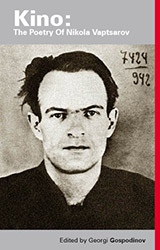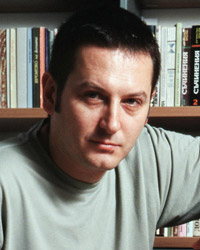Kino - OUT OF PRINT
The Poetry of Nikola Vaptsarov

The Bulgarian writer Nikola Vaptsarov (1909-1942) was one of the most significant European poets of the twentieth-century, a radical Modernist whose work has often been compared to that of Mayakovsky and Lorca. A marine engineer, fireman, fitter, railway-stoker, trade-unionist and a Communist, Vaptsarov was executed during the Second World War for his part in the Bulgarian resistance. He was thirty-three.
Although only one book of Vaptsarov's poems, Motor Songs, was published in his life-time, since his death his poetry has been translated into over fifty languages. He wrote a quick, colloquial, concrete, argumentative poetry that transcended the usual idioms of Communist ideology to include cinema, radio, adverts, popular culture and modern technology.
Sample Poems
History
What will you give us, History,
in your faded pages?
We came from offices and factories,
the nameless of the ages,
We were peasants, and we stank
of stale onions and bread,
we swore madly into our beards
at the cursed life we led.
You should at least be grateful
that we nourished you so well,
let you drink the blood of thousands,
feed on the flesh of those who fell.
You will only catch the outlines,
of a life you cannot know
if there's no–one to reveal
the simple human drama's flow.
No doubt the poets will be busy
with their pamphlets and affairs
and our unwritten misery
will hover in the empty air.
Is our story worth describing?
Perhaps it is best forgotten?
It will stink if you touch it,
poisonous and rotten.
We were born beside the fields
beneath the hedge–row thorns,
our mothers lay there, frozen stiff,
biting their lips in the dawn.
We perished like flies in Autumn,
on All Souls' Day each year
the women turned their weeping into song
that only the weeds could hear.
Those of us who survived,
we took any job we could,
labouring day and night
Ttill we sweated blood.
At home our fathers used to tell us
that you can't argue with fate,
but we spat on their idiotic wisdom,
'Just watch us try!' we said.
And we left the dinner table
arguing into the night,
where a gentle hope touched us
with something beautiful and light.
O, how anxiously we waited
in those crowded street cafes!
going to our midnight beds
after the last communiqués.
O, how we drifted in our hopes!
while the heavy sky hung low
and the whistling air turned white hot
till we could not stand it any more.
But in your many volumes
our suffering may be heard,
a howl of pain that echoes
in the gaps between each word.
For life continues to beat us
with its cruel and heavy claws
right across our hungry mouths.
That's why our tongue is coarse,
And why, in the early hours
the poems that we write
are sullen and brief,
not perfumed and bright.
We don't need rewards for our pain
recorded in your pages,
don't dress us up in clichés
or the pity of the ages.
To those who will come later,
our message is simple and short:
just tell the people of the future
how bravely we fought.
Antenna
The sky hangs low above the roof–tops,
outside in the wind the aerials shake.
I'm lying here thinking about the news.
me and the radio are both wide awake.
The voice of a malicious agitator
buzzes like a hornet in my sleepless brain;
stung by the stupid droning speech
I change the radio stations again.
I pick up the swing of the saxophones
the heat of a woman's black thighs –
was it for this that we were created
beneath Africa's wide and tropical skies?
Just to sway in time to a jerky beat
in the sweltering heat of a jazz–revue,
exotic dancers in a cabaret?
Is this really the best that we can do?
As if life ever flowed simply as this,
like the calm Danube down to the sea!
We could be running towards the Spring
where the winds blow hard and free.
Tonight the news reaches us clearly.
Outside in the wind the aerials still shake.
O humanity – when you stop dreaming,
then the whole world will wake.
'The struggle is mercilessly cruel'
The struggle is mercilessly cruel.
The struggle, as they like to say, is epic.
I fell. Someone else will take my place.
That's all. What does one person matter?
The firing squad. And then the worms.
The facts can't be denied.
But when the storm comes, my people,
we will be there at your side!



